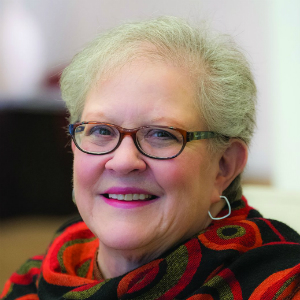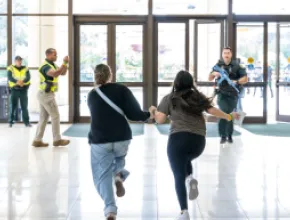One question asked in the 2019 Meetings Today Trends Survey was “Do you have a written disaster/security plan?” The responses were 28% yes, 44% no and 28% working on it.
This is the question and responses that, perhaps more than others, caught my eye. It’s also the one I’ve also written in more detail about in the blog section of the February 2018 Friday With Joan newsletter.
I asked three colleagues to review and respond the above article.
In alphabetical order they are:
Brad A. Goldberg, Deputy Executive Officer,
United States Air Force, Years in Hospitality: 26
Email Contact: bgallyn@gmail.com
Tyra Hilliard, Ph.D., Esq, CMP, Attorney,
Professor at College of Coastal Georgia,
Years in Hospitality: 25+, Email Contact: tyra.hilliard@gmail.com
Ken Wheatley, Founder/Principal Advisor, Royal Security Group LLC,
Years in Hospitality: 25 [Ken has worked for 31 years in security, 24 at Sony],
Email Contact: Ken@RoyalSecurityGroup.com
Q1. What do you read into the numbers and the comments?
What does your reality tell us?
Brad Goldberg (BG): Bottom line is that Oklahoma City, New York (9/11), Las Vegas and Jacksonville mean nothing. Most responses to the question show a lack of understanding of the size of the issue.
Tyra Hilliard (TH): The numbers tell me things have not changed in a long time.
I did my Ph.D. dissertation on “The Crisis Preparedness of Meeting Planners” in 2009 and the numbers of people who are prepared has not changed appreciably since then.
The comments tell me that we still have not defined the terminology well. Based on the responses, people have vastly different ideas of what is meant by risk, security, disaster preparedness. We need to integrate best practices and standardized resources into our education and training in the meetings industry.
Too much of our education in this industry has been random meeting and event planners saying, “This happened to me, now let me tell you how to make your events safer.”
[Related Content: A Plea for Better Risk and Contingency Planning at Meetings]
There are best practices. And they are not from the meetings industry! Crisis preparedness, disaster recovery, business continuity—these are professional fields of their own. We need to look to them, to professionals from these fields, to educate us, to prepare us.
Trying to educate ourselves simply hasn’t worked. And I say that as one of us who has tried to study those fields and educate us.
It starts with speaking the actual crisis preparedness language.
Use definitions from the Disaster Recovery Journal or FEMA 141 or NFPA 1600 instead of each of us making up our own vernacular based on our “experiences.”
Then [we need to begin] taking the best practices from the same expert resources and applying them to meetings and events.
Ken Wheatley (KW): From my experience, I expected the “yes” number to be lower, and the “no” number to be higher. Even after all that has happened over the years, it’s obviously not a priority for most organizations.
As some of the responders cited, crisis management, risk management, and/or contingency planning is viewed as someone else’s responsibility—the operations team, the client, the police, the safety or corporate security department, the venue, etc. Or they’re too busy, it isn’t a priority, or the likelihood of something happening is minimal, etc. But the failing is from the leadership of a company and the insurance companies. It’s a “tone-from-the-top” issue.
If the Board of Directors or the senior leadership of a company deemed these plans—and the testing of those plans—as a business priority, then the time and resources would be allocated to get the job(s) done. If an insurance carrier wanted to limit their exposure to a claim, they would insist that the preventative planning was done.
Q2. What can we (us individually; “we, the industry”) do to reinforce the need for greater knowledge of and practice of risk and contingency planning?
Given that we’ve been through, in the most recent past, the Las Vegas concert shooting, hurricanes that devastated Puerto Rico and portions of Florida, and much more prior to those events?
BG: Nothing. The [hospitality] industry has no interest in coming together to understand this issue at the most basic levels. I have spoken at numerous meetings, conferences and I hear the same thing—have to develop a plan, have to re-look at our plan, a plan is a great idea, and of course my favorite, we won’t need a plan because—we are too small or have so few meetings.
TH: Stop delivering diluted, half-baked education delivered by non-experts on this important topic. Agree to work together across organizations to create crisis preparedness best practices driven by true experts in the field of crisis preparedness—not just meeting planners who have been through a thing or two. The topic is so fragmented at this point that it’s become just noise and I feel like people are tuning out.
The lack of continuity and depth have eroded the importance of the knowledge.
Many people want an off-the-shelf easy solution. There isn’t one.
Instead of explaining the importance of investing the time, energy, and money in doing it right, we capitulated and gave them shortcuts, light versions where they needed intensity.
It was a disservice and instead of drawing them in to learn more, they considered it fulfillment of their needs.
KW: If a Board of Directors, or the senior management of an organization hasn’t done a non-financial risk assessment to understand where they are vulnerable and what, if any threats their industry may confront, or a particular event might attract, then they have no idea, really, of what would bring their business to its knees.
Or what liabilities they are exposing the business to.
3. Where is your energy around hope for the future of risk assessment and contingency planning by those who work in meetings and hospitality?
BG: There is no energy, I work for a government agency that deals with emergencies every day and yet if we have to react to a real emergency in our offices or at a conference that is held in a public area (not secure), we will react the same as the civilian companies and just panic and do PR recovery after.
TH: This question alone leaves me without a lot of hope. Risk assessment and contingency planning are but two tiny steps in overall crisis preparedness.
But to get at the gist of the question—if we continue on our current trajectory, I think crisis preparedness is going the way of the fad. It is being monetized. It is a “hot” topic being capitalized on by organizations who are not putting any serious inquiry behind it. This was my passion enough to study it for several years and complete my Ph.D. dissertation on the topic. But even I don’t spend much time on it anymore because it seems like an exercise in futility.
KW: All we can do is continue to educate the stakeholders that safety and security is everyone’s responsibility and risk management and contingency planning is just as important to the success and profitability of the meeting planner organizations and their clients.
[Read This Next: Meetings Trends (We've Only Come This Far?!)]
Click here to view additional content in the 02.01.19 Friday With Joan newsletter.







